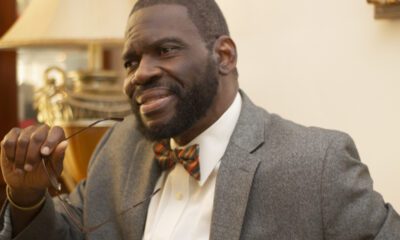Political Issues
Wike’s Rhetoric Mirrors Trump’s – Urge Your People to Go Home -By John Egbeazien Oshodi
The expiration of the tenure of local government chairmen and the court’s suspension of state assembly legislators, coupled with their refusal to relinquish power, has plunged the state into a crisis that echoes the confrontational politics seen in the United States.

In the annals of political history, few moments have been as alarming as the events that unfolded on January 6, 2021, at the United States Capitol. The world watched in disbelief as supporters of then-President Donald Trump, fueled by his rhetoric of a stolen election, breached the very citadel of American democracy. Trump’s belated and tepid call for his supporters to “go home” was a stark reminder of the power of words in the face of unrest.
Half a world away, in Rivers State, Nigeria, a similar narrative of political tension and unrest is unfolding, with former Governor and current Federal Capital Territory (FCT) Minister, Nyesom Wike, at its center. The crisis, sparked by the expiration of local government chairmen and state assembly legislators’ tenures and their refusal to relinquish power, mirrors the confrontational politics seen in the United States.
The expiration of the tenure of local government chairmen and the court’s suspension of state assembly legislators, coupled with their refusal to relinquish power, has plunged the state into a crisis that echoes the confrontational politics seen in the United States.
No matter how the courts are used, or the federal might is employed to torment Rivers State, as in Wike’s case, both Trump and Wike, along with their followers, must understand that no individual can defeat the will of the people or halt true governance indefinitely. Indeed, like Trump, who took his cases to different levels of the judiciary, including the Supreme Court, Wike has also shown a propensity for legal battles, albeit through indirect means. Trump’s challenges to the election results were met with numerous lawsuits, many of which were dismissed or ruled against him. His ultimate appeal to the Supreme Court was also unsuccessful, as the Court declined to overturn the election results.
Similarly, Wike, through his words and actions, has encouraged former local government chairmen and state legislators to engage in legal disputes, challenging decisions made by his political opponents. While the specifics of his legal battles may differ from those of Trump, both leaders have strategically used the judicial system to advance their political goals. In both cases, the courts have become a battleground for contesting outcomes. However, the judiciary’s role is to uphold the law and the constitution. In the United States, the courts have preserved the integrity of the electoral process. In Nigeria, where the courts can sometimes be compromised by politicians, it is imperative that they do what is right, not for one man, but for the democratic system.
Wike’s approach to legal and political challenges may differ in style from Trump’s, but the underlying strategy of using the courts to contest outcomes is similar. While Wike may not be filing the lawsuits himself, his rhetoric and actions have emboldened former local government chairmen and state legislators to take their cases to various courts in Abuja and Port Harcourt. This indirect method of engaging with the judiciary allows Wike to maintain a degree of separation from the legal battles while still influencing the narrative and the actions of his supporters. It is a tactic that can be seen as both politically savvy and potentially destabilizing, as it prolongs the legal and political disputes that have engulfed Rivers State.
The situation in Rivers State is a powder keg waiting to explode, and it is incumbent upon Wike to take decisive action. Just as Trump was eventually compelled to address the nation and call for an end to the violence, Wike must now step forward and unequivocally declare that the time for confrontation is over. He must urge his supporters to stand down, to return home, and to allow the democratic process to take its course.
The imperative of ‘Go Home’ is not just a call for physical dispersal; it is a plea for a return to civility and a commitment to the rule of law. Wike’s leadership in this moment of crisis will be judged not just by his words, but by the actions he takes to de-escalate the situation and prevent further bloodshed.
As the world watches Rivers State, the echoes of the Capitol riot serve as a chilling reminder of the potential consequences of political incitement. Wike and Trump, despite the vast differences in their political landscapes, are now inextricably linked by the expectations placed upon them to lead their followers away from the brink of disaster.
The time for ‘Go Home’ is now. The future of Rivers State, and the legacy of Nyesom Wike, hangs in the balance. The choice is clear: leadership must rise to the occasion, or history may well repeat itself, with devastating consequences.
In the aftermath of the January 6, 2021, insurrection at the United States Capitol, the nation moved forward with the inauguration of President Joe Biden. Similarly, in Rivers State, Nigeria, a new caretaker committee has been sworn in, along with a new speaker and state assembly, signaling a shift in leadership and governance.
The events at the Capitol, instigated by then-President Trump and his supporters, had a profound effect on the American populace. In the wake of the violence and chaos, more Americans began to rally behind President Biden, viewing him as a beacon of stability and a return to democratic norms. This shift in public sentiment was a direct response to the actions of Trump and his followers, who had tarnished the image of the presidency and threatened the peaceful transition of power.
In Rivers State, the rise in support for Governor Siminalayi Fubara is a direct response to the turmoil instigated by former Governor Nyesom Wike. The refusal of local government chairmen to step down after their terms expired, along with the suspended state assembly legislators’ defiance, created a climate of unrest and illegitimacy. This situation, exacerbated by Wike’s inflammatory rhetoric, has galvanized many in Rivers State to rally behind Governor Fubara as a leader who truly represents the will of the people and the sanctity of democratic processes.
The comparison between Wike and Trump is not just about their influence over their followers; it’s also about the reaction of the broader populace to their leadership styles. In both cases, the actions of the leaders and their supporters have led to a significant portion of the population seeking a return to normalcy and stability.
As President Biden worked to heal a divided America, Governor Fubara faces a similar task in Rivers State. The new leadership in both contexts is tasked with rebuilding trust, restoring order, and reaffirming the values of democracy.
The imperative of ‘Go Home’ extends beyond a literal call for dispersal; it is a metaphor for the need to return to the principles that underpin democratic societies. For Wike, this means recognizing the legitimacy of the new administration in Rivers State and encouraging his supporters to embrace the democratic process.
In both the United States and Rivers State, the path forward requires a commitment to peace, a respect for the rule of law, and a willingness to work within the framework of democratic institutions. The legacy of Wike and Trump will be judged not only by their actions during their time in power but also by their ability to facilitate a smooth transition and support the leaders who follow them.
As these legal challenges unfold, the focus remains on the leadership of Wike and the extent to which he will use his influence to de-escalate the situation or advance his political agenda. The judiciary, once again, finds itself at the epicenter of political controversy, tasked with navigating the complex interplay between law, politics, and power. As the world watches, the echoes of uprising and unrest serve as a stark reminder of the fragility of democracy and the critical need for responsible leadership. The time for ‘Go Home’ is now—not just for the followers of Wike and Trump, but for the leaders themselves—to step back, reflect, and allow the democratic process to continue unimpeded.

John Egbeazien Oshodi
Professor John Egbeazien Oshodi, born in Uromi, Edo State, Nigeria, is an American-based police and prison scientist, forensic psychologist, public policy psychologist, and legal psychologist. He’s a government advisor on forensic-clinical psychological services in the USA and the founder of the Dr. John Egbeazien Oshodi Foundation for Psychological Health. With a significant role in introducing forensic psychology to Nigeria through N.U.C. and Nasarawa State University, he’s also a former Secretary-General of the Nigeria Psychological Association. He’s taught at esteemed institutions like Florida Memorial University, Florida International University, Nova Southeastern University, and more, and is currently an online faculty member at Weldios University, Nexus International University, and Walden University. John.Oshodi@mail.waldenu.edu










